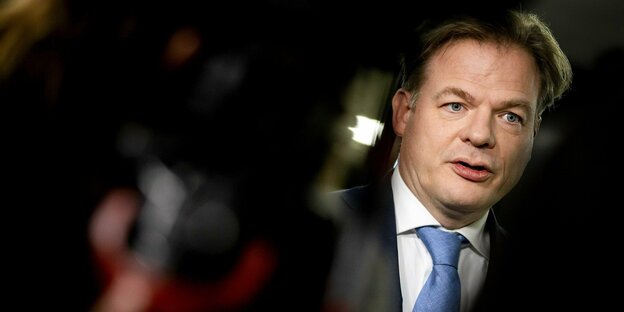Coalition talks with right-wing populist Wilders have failed… for now. The head of the social conservatives cites the state budget as the reason.

Pieter Omtzigt, NSC, speaks to journalists in The Hague on November 29, 2023 Photo: Koen Van Weel/ANP/dpa
AMSTERDAM taz | More than two months after the Dutch parliamentary elections, negotiations for a new government have so far failed. Pieter Omtzigt, head of the social conservative party, announced on Tuesday evening New social contract (NSC) does not want to continue negotiating a majority coalition. This should include the right-wing populist Freedom Party (PVV), the former liberal right-wing ruling party VVD and the Peasant-Citizen Movement (BBB). The PVV clearly won the November elections and the newly founded NSC achieved a strong result as the fourth largest party.
Omtzigt attributed the failure to the state of the state budget, on which updated information has recently been received. In a letter to party members he writes that he is “very dismayed” by the financial situation. Under no circumstances do you want to make promises to the population that you already know are empty. “You cannot create existential security from pie-in-the-sky castles.”
The issue of “security of existence” is central to the NSC party program, according to which citizens have the right to the satisfaction of basic needs such as healthcare, energy and healthy nutrition. It is one of the reasons for the party's rapid rise and popularity across all corners of the political spectrum. At the same time, Omtzigt is not a debt advocate.
The budget, it seems, is a lifeline to free his party from the emerging center-right constellation, at least for the moment. Both in the NSC, often described as a centrist party, and personally in Omtzigt, reservations about a coalition with the right-wing populists have been expressed since the beginning of the negotiations. The reason is their opinions on mosques or Koranic schools, which, according to Omtzigt, violate the constitutional principle of equality and religious freedom. After the Christmas holidays, PVV boss Wilders demonstratively withdrew his party's controversial legislative plans to demonstrate his capacity for compromise.
Minority coalition becomes more likely
Since then, conditions at the negotiating table have deteriorated significantly, between Wilders and Omtzigt, but also with Dilan Yeşilgöz, the current Minister of Justice and main candidate of the liberal-right VVD. Following the electoral defeat of his party, which has been in power since 2010, Yeşilgöz initially announced that he would not be part of the right-wing coalition in question, but would only support a corresponding minority government. The positions of Yeşilgöz and Omtzigt show that both parties are deeply divided on cooperation with right-wing populists.
And now? Ronald Plasterk, who is leading the negotiations and is due to report on his situation to Parliament next week, called Omtzigt's reasoning “complicated.” PVV, VVD and BBB want to discuss the situation with Plasterk on Wednesday afternoon. The NSC rejected the invitation and wants to wait for Plasterk's report.
Omtzigt also said on Tuesday afternoon: The NSC was open to negotiations on a minority coalition. The only thing that is clear is that Mark Rutte's caretaker government will likely remain in office for a longer period of time.